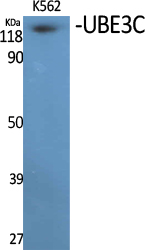UBE3C Polyclonal Antibody
- Catalog No.:YT4802
- Applications:WB;ELISA
- Reactivity:Human;Mouse
- Target:
- UBE3C
- Fields:
- >>Ubiquitin mediated proteolysis
- Gene Name:
- UBE3C
- Protein Name:
- Ubiquitin-protein ligase E3C
- Human Gene Id:
- 148581
- Human Swiss Prot No:
- Q15386
- Mouse Swiss Prot No:
- Q80U95
- Immunogen:
- Synthesized peptide derived from the Internal region of human UBE3C.
- Specificity:
- UBE3C Polyclonal Antibody detects endogenous levels of UBE3C protein.
- Formulation:
- Liquid in PBS containing 50% glycerol, 0.5% BSA and 0.02% sodium azide.
- Source:
- Polyclonal, Rabbit,IgG
- Dilution:
- WB 1:500 - 1:2000. ELISA: 1:10000. Not yet tested in other applications.
- Purification:
- The antibody was affinity-purified from rabbit antiserum by affinity-chromatography using epitope-specific immunogen.
- Concentration:
- 1 mg/ml
- Storage Stability:
- -15°C to -25°C/1 year(Do not lower than -25°C)
- Other Name:
- UBE3C;KIAA0010;KIAA10;Ubiquitin-protein ligase E3C;HectH2
- Observed Band(KD):
- 125kD
- Background:
- function:E3 ubiquitin-protein ligase that accepts ubiquitin from the E2 ubiquitin-conjugating enzyme UBE2D1 in the form of a thioester and then directly transfers the ubiquitin to targeted substrates. It can target itself for ubiquitination in vitro and may promote its own degradation in vivo.,miscellaneous:A cysteine residue is required for ubiquitin-thioester formation.,pathway:Protein modification; protein ubiquitination.,similarity:Contains 1 HECT (E6AP-type E3 ubiquitin-protein ligase) domain.,similarity:Contains 1 IQ domain.,subunit:Interacts with 26S proteasomes. Binds CAND2.,tissue specificity:Highly expressed in skeletal muscle. Detected at much lower levels in kidney and pancreas.,
- Function:
- function:E3 ubiquitin-protein ligase that accepts ubiquitin from the E2 ubiquitin-conjugating enzyme UBE2D1 in the form of a thioester and then directly transfers the ubiquitin to targeted substrates. It can target itself for ubiquitination in vitro and may promote its own degradation in vivo.,miscellaneous:A cysteine residue is required for ubiquitin-thioester formation.,pathway:Protein modification; protein ubiquitination.,similarity:Contains 1 HECT (E6AP-type E3 ubiquitin-protein ligase) domain.,similarity:Contains 1 IQ domain.,subunit:Interacts with 26S proteasomes. Binds CAND2.,tissue specificity:Highly expressed in skeletal muscle. Detected at much lower levels in kidney and pancreas.,
- Subcellular Location:
- proteasome complex,intracellular,nucleus,cytoplasm,
- Expression:
- Highly expressed in skeletal muscle. Detected at much lower levels in kidney and pancreas.
- June 19-2018
- WESTERN IMMUNOBLOTTING PROTOCOL
- June 19-2018
- IMMUNOHISTOCHEMISTRY-PARAFFIN PROTOCOL
- June 19-2018
- IMMUNOFLUORESCENCE PROTOCOL
- September 08-2020
- FLOW-CYTOMEYRT-PROTOCOL
- May 20-2022
- Cell-Based ELISA│解您多样本WB检测之困扰
- July 13-2018
- CELL-BASED-ELISA-PROTOCOL-FOR-ACETYL-PROTEIN
- July 13-2018
- CELL-BASED-ELISA-PROTOCOL-FOR-PHOSPHO-PROTEIN
- July 13-2018
- Antibody-FAQs
- Products Images

- Western Blot analysis of various cells using UBE3C Polyclonal Antibody. Secondary antibody(catalog#:RS0002) was diluted at 1:20000 cells nucleus extracted by Minute TM Cytoplasmic and Nuclear Fractionation kit (SC-003,Inventbiotech,MN,USA).
.jpg)
- Western Blot analysis of HuvEc cells using UBE3C Polyclonal Antibody. Secondary antibody(catalog#:RS0002) was diluted at 1:20000 cells nucleus extracted by Minute TM Cytoplasmic and Nuclear Fractionation kit (SC-003,Inventbiotech,MN,USA).



